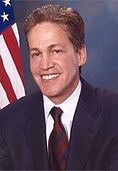United States Senate election in Minnesota, 2002
|
|
|||||||||||||||||
|---|---|---|---|---|---|---|---|---|---|---|---|---|---|---|---|---|---|
|
|||||||||||||||||
|
|||||||||||||||||

County results
|
|||||||||||||||||
|
|||||||||||||||||
The 2002 United States Senate election in Minnesota took place on November 5, 2002. Incumbent Democratic U.S. Senator Paul Wellstone was running for re-election to a third term, but died in a plane crash eleven days before the election. The Democratic-Farmer-Labor Party (DFL) chose former Vice President and 1984 Presidential candidate Walter Mondale to replace Wellstone on the ballot. Mondale lost to Republican Mayor of Saint Paul Norm Coleman. The day before the election, Independence Governor Jesse Ventura had appointed Dean Barkley (IP) to serve the rest of Wellstone's term. As of 2016, this is the last Senate election in Minnesota won by a Republican.
Paul Wellstone defeated Dick Franson 93% to 5%.
Norm Coleman defeated Jack Shepard 95% to 5%.
* Paul Wellstone still appeared on the ballot despite his death (he had been replaced by former Vice President of the United States Walter Mondale)
At the time of his death, Wellstone was slightly ahead in the polls. After Walter Mondale was chosen as the DFL candidate, in a poll taken a few days before the election Mondale was leading 51% to 45%. Early on Election Day, Mondale was leading in votes. By nightfall, however, Norm Coleman pulled ahead, winning by 49.5 percent to 47.3 percent.
* Wellstone was listed as the incumbent, and remained on the ballot despite a court order replacing Wellstone's name with Mondale's.
After Norm Coleman was declared the winner, Walter Mondale conceded and said in his speech, "At the end of what will be my last campaign, I want to say to Minnesota, you always treated me well, you always listened to me." Mondale's loss of this election, combined with his landslide defeat in the United States presidential election in 1984, made him the only American major-party candidate to lose an election in all 50 states. Although Mondale did not seek office again, he remained active politically. The election victor, Norm Coleman, was sworn-in on January 3, 2003 as the first Republican to hold that Senate seat since Rudy Boschwitz left office in 1991. Coleman would serve in the United States Senate until losing to Al Franken by a very small margin in the following election.
...
Wikipedia


